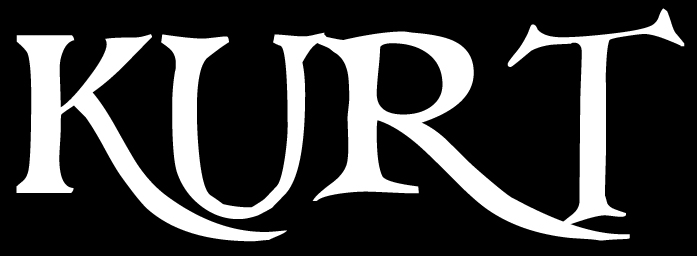
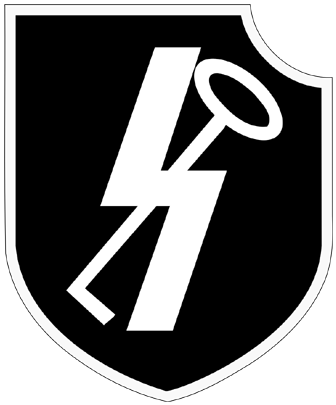
Interview with Kurt, a young Hitler Youth member trained as a Panzer Gunner in a Mark IV tank of the heroic 12th SS Panzer Division "Hitlerjugend", Travemünde, 1988.

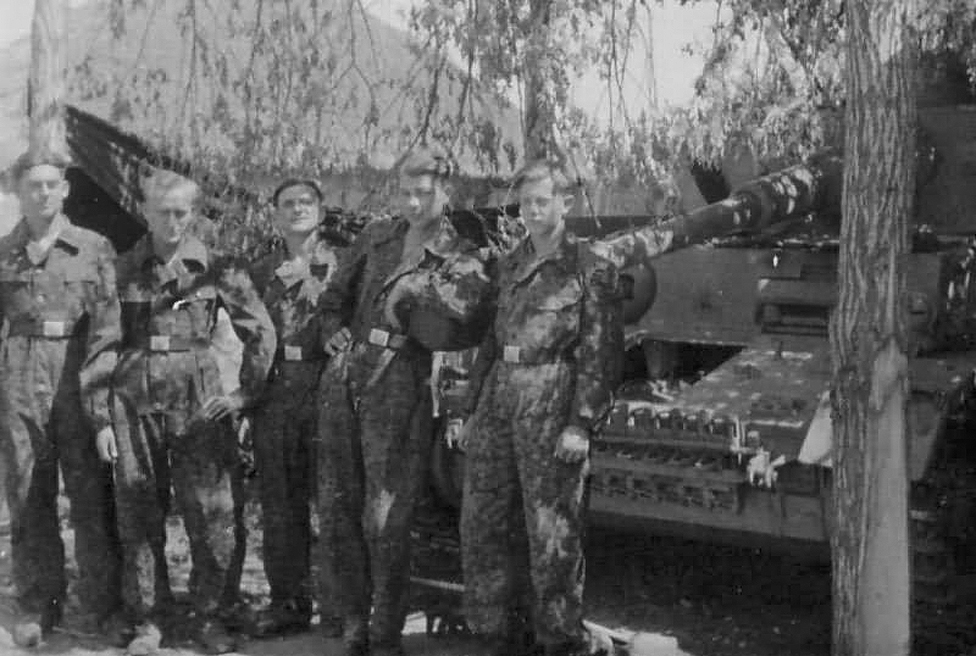
[Above: Young warriors of the 12th SS Panzer Division "Hitlerjugend" in front of their Mark IV in the Normandy meatgrinder.]
Thanks for letting me speak with you; if I may I would like to ask what life was like in Germany and why you chose to go into the Waffen-SS?
Kurt: Please, that is an easy one boy. It was in 1944, and I had been in the HJ [Hitler Youth] for 3 years. I was only 17 years old then. I had my whole youth still to live and the war came and stole it from me.
I never wanted to be a soldier; I wanted to be in the fire service like my father. I must tell you about that. My father entered the fire service in 1927, the year I was born. I was always at the fire house with him and liked learning all about firefighting. Germany had some of the most advanced life-saving equipment, I am proud of that.
Germany led the world in new technology for fire equipment, my father let me try on and use the new things they acquired in the late 30s. I remember the truck was new, with a water tank and special ladder to reach to higher levels. I would see how fast I could climb, and then come down.
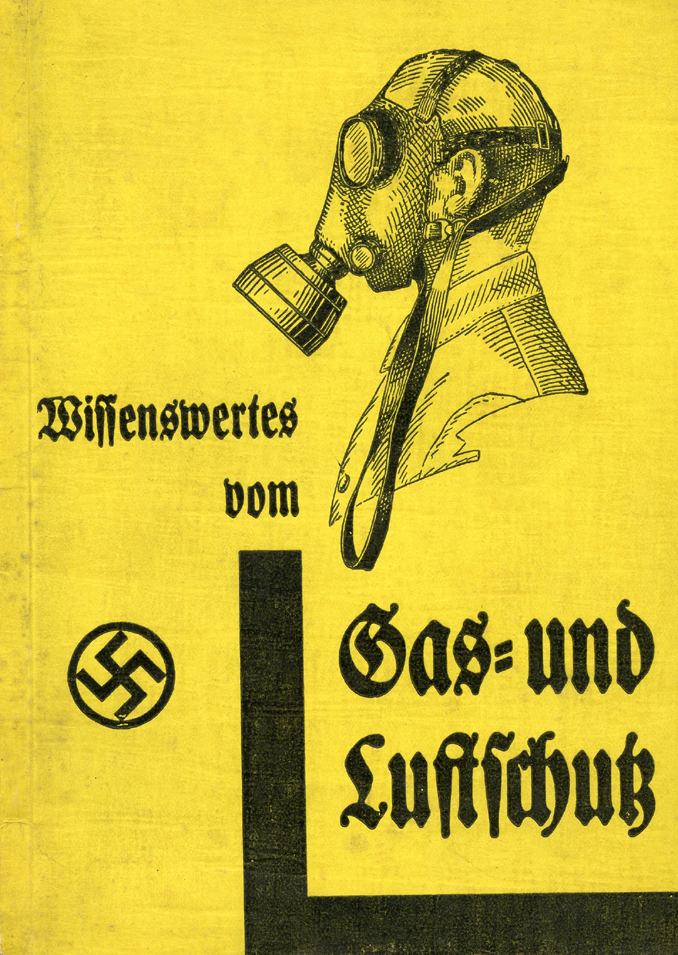
[Above: Although from 1933, this booklet shows many interesting examples of German gasmask technology. Click to enlarge and see many photos from within the booklet.]
My mother stayed home raising me. I remember life being very pleasant for us. We even went on a family vacation to Norway in 1939 that the Strength Through Joy gave my father. He was part of the fire union and received many perks under the National Socialist government; he also stressed that to me.
I was put into the HJ in 1939 at 12 and I was not enthusiastic at that, I did not get along well with many of the neighborhood kids, they were bullies and I was a small non-athletic kid whom they picked on. In the HJ fitness was stressed very heavily, with lots of rough housing and boxing. This did not suit me and my mother even protested to the leader, but he brushed her off and said I needed to become a man.
They did not want weaklings or cowards, so I was made to conform to the mold they wanted. I became stronger I noticed, and my leaders worked with me to develop boxing skills, and I became quite good at running as well. So I did not like it all the time, but it did give me confidence that served me later on.
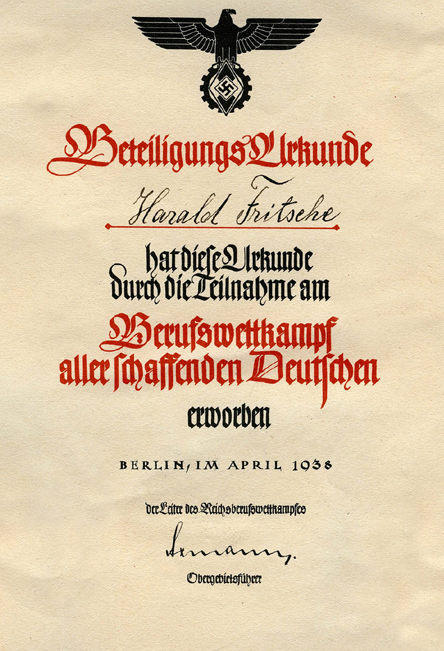
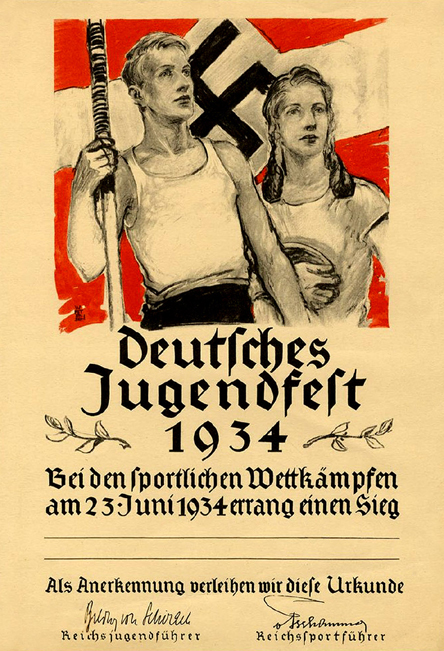
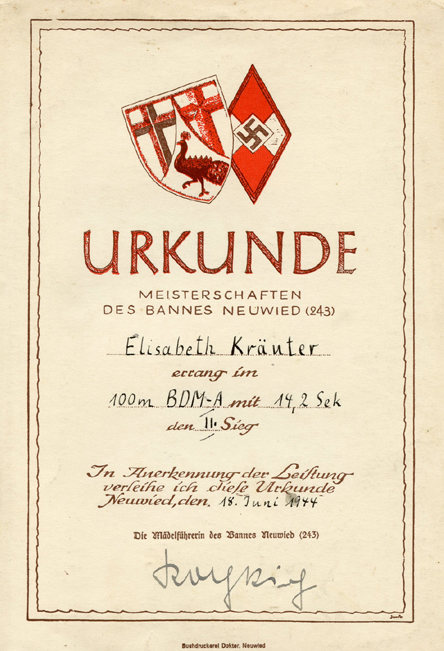
[Above: Hitler Youth and League of German Girls sports award certificates. Click to enlarge.]
When the war began in 1939 I remember being excited at the new adventures it might bring. I had no idea how bad it would end up being. We were very carefree back then, we believed Germany was strong enough to take on all our enemies and prevail. In this we were proven wrong, but we believed we could win right up until the very end.
In school we had to practice air raid drills, and learn to put out fires, I liked those drills a lot and did well with them. My father had to go to special training, I remember, to deal with bombs. The French and English started to bomb German cities in 1939 and the fire service had to be ready.
My father had to attend much training that kept him very busy. He was also part of the air defense to put out bomb fires, and he told me later the Allies used phosphor bombs that were hideous. They could not be put out with water, and would keep burning.
In 1943 the Waffen-SS started recruiting from the ranks of the HJ. We were in total war now, before this you would not know a war was being fought. Life was as in peacetime. I was not a soldier, but I still felt a duty to go serve my country. Self sacrifice was stressed to us, I did not want to join in 1943, but changed my mind in 1944.
I was allowed by my parents to go. So I spoke to my leader and was sent to the recruitment office and started all the papers. This late in the war the SS was not hard to get into like I understand it had been.
I had to go with a group and we had exams by SS doctors, it was like going for a checkup. They listened to our hearts, checked the spine and feet, tested the eyes, and drew blood. Once I passed I was sent for training, this was during the invasion so times were tense. Many of the boys who had left training were now in action.
My group was asked to list where we would like to end up; there was no firefighting in the Waffen-SS. I liked vehicles that offered protection so I chose the Panzer arm. I was selected and after basic training sent to the Panzer school.
What Panzers did you train on?
Kurt: Well, first let me tell you something, you also had to pick a trade inside the Panzer arm; you could either be a driver, radio operator, loader, or gunner. I chose to be a gunner. I learned to shoot rifles in the HJ and was very good at it. I thought I would also be good with cannons.
I should say too that we all had to know each other's job to some degree so if one was wounded the other could carry on. We had the early Mark III Panzers mostly to train with, they were similar to the Mark IV and we had one to use so we could get familiar with its systems.
If I can recall the training was a 16 week course and then we were assigned to the Panzer regiment as trainees still. We crewed the newer Mark IV Panzers with the long barrel. These guns were deadly to any Allied armor, and we trained to hit on the first shot. Training was more relaxed than the basic training earlier.
I recall we had many men from the LSSAH [Leibstandarte SS Adolf Hitler] who had much combat experience; most all of whom wore the Panzer Badge and the Iron Cross. They would always tell us to listen to them, as their teaching would keep us alive. They told many harrowing stories about life on the east front. One man held the Iron Cross First Class for knocking out four Russian tanks in one battle.
While at the school more and more men were pulled away I remember, as Normandy was not going well. We would see some of the wounded who came back after time in hospitals. They told of the Allied air power and overwhelming numbers that defeated their best efforts. As you can imagine this was not comforting to us who thought we would soon go into battle as well.
Their words did make us pay extra attention and training with a focus. We knew Germany was alone fighting the combined might of the world's powers and only superhuman resolve and effort could win the war. This time in the war was very rushed and disorganized I thought. We were declared frontline ready in September of 1944 and that was when the division commander was captured.
This did not bode well for us I thought. It was announced Kurt Meyer was missing when we arrived at our assembly areas. The HJ Division was a mess to say the least; morale was low as Normandy had taken a large part of the division. The survivors had a wild look in their eyes, I remember.
We arrived thinking we were going to right the ship, but they quickly snapped us out of that feeling. Replacements came in and for awhile things were pretty confused. We still did ready drill and training when we could, but now we had to be trained for Allied air attacks. The Mark IV was easy to knock out with the rockets they shot.
I arrived when a new commander was announced, Sturmbannführer Hubert Meyer. He gave a speech to us to speak about self-sacrifice and what we were fighting for. The mood was grim, but I must say our morale was high; we really looked forward to going into action. He hinted that a big offensive was being talked about and it would involve our division.
I remember also that many Party and military leaders came to see us, the reputation the division built in Normandy brought adoration. I looked around and saw the young faces of my comrades, and to know they took on a superior foe and held them off for weeks inspired me. It gave me confidence we could do it again. However fate intervened in my life in November 1944.
I remember I was cleaning our Panzer after a road march, and my Spiess [German military slang name for the Company sergeant major] came and said the commander needed to see me. He walked with me and said now is the time to be brave. I was scared as I thought I was in trouble. I had earlier taken an extra ration for myself and I thought my goose was cooked.
When we entered his office, I saluted and he asked me to sit down. He had a grim look on his face. He said he had the duty to report some bad news, and that the division was there for me. He read a telegram from the SS office and my mother. It advised that my father had been killed during an air raid November 27, 1944. The Allies had bombed the city, and my father went out to help.
As he was entering a building to search for survivors a bomb exploded, killing him [the righteous Allies had designed devious bombs to be timed to go off when civlians and firefighters would be on the scene helping the injured]. As I was the sole surviving male of the family, my mother petitioned that I be released to help her attend to the home. The Waffen-SS granted this request, and discharged me in December. I had been granted emergency leave in the meantime. My military career was very short, but likely this event saved my life.
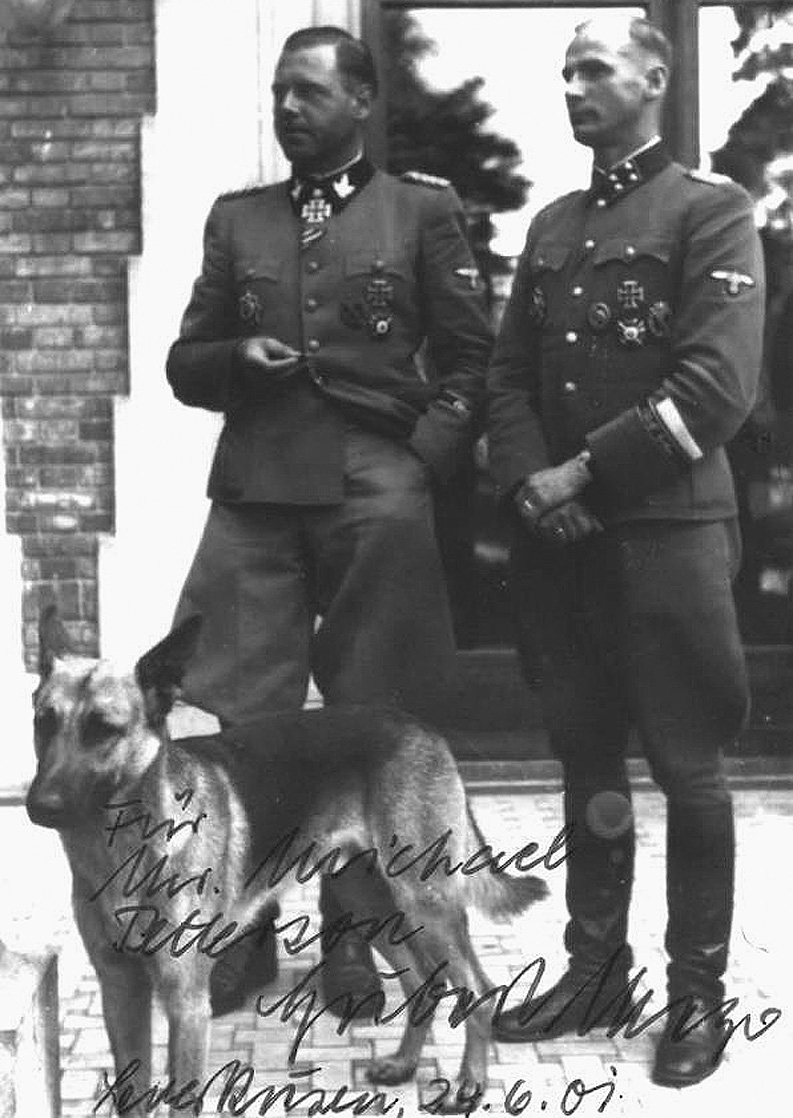
[Above: The legendary martyr Fritz Witt (left) and Hubert Meyer (autographed by Meyer).]
What happened when you came home?
Kurt: By December of 1944, almost all large cities had been bombed badly, there was much repair work that needed to be done. I was hired to help remove debris and clear streets. We had to move out to the country as our home was damaged and smelled of smoke. I took a motor bike into the city to work. My mother was joined by her sister and her children, her husband was a navy man stationed in Norway. In April of 1945 the French came and occupied the whole area, I had heard bad things from older people who had lived through occupation after the first war.
I stayed with my mother, and we moved to Lake Constance that summer, as a French soldier had threatened her. I was arrested for being in the Waffen-SS; I showed my papers stating I was discharged with no combat experience. The French were quite rough with me and others, but after a couple of weeks I was released.
We were all glad it was over, it had been a harrowing six years of war, and now peace finally came. The Allies brought revenge with them, however, and they arrested anyone who had any affiliation with the party or the SS.
I had a friend who went to a NAPOLA school ['National Political Institutes of Education' were special schools for future leaders in the Third Reich] and he disappeared in June and no one saw him again. So that is how it was for us after the war. We mourned our dead and set out to rebuild our lives and our nation. The amount of work it took to rebuild is a testament to the German spirit. We had a saying, "Our walls are broken but not our hearts".
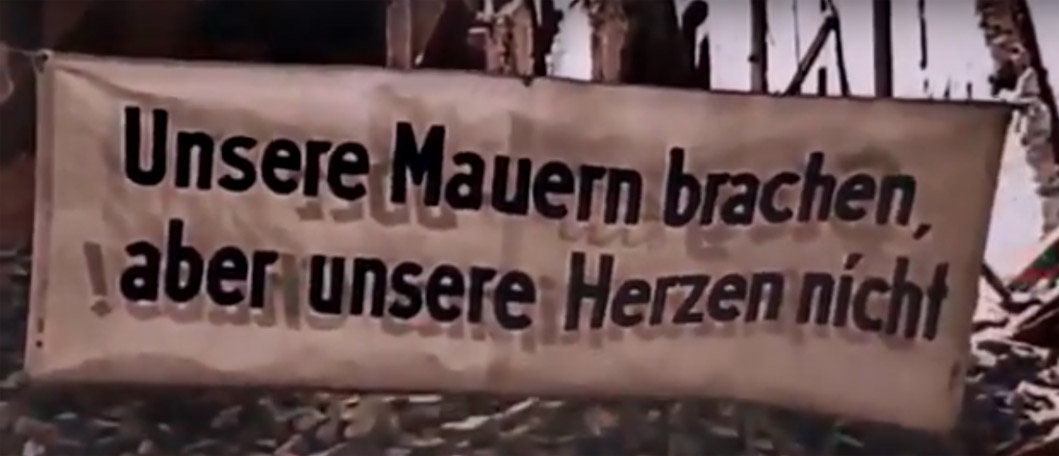
[Above: A defiant saying in Germany during those dark days was 'Unsere Mauern brachen, aber unsere Herzen nicht' meaning 'Our walls may break, but never our hearts!']
Can I ask your thought about the Allied claims that the Waffen-SS was a criminal group of men?
Kurt: You must remember I was not in any actions so I would not have seen anything to make a determination. I can tell you I heard from the boys who were in the fighting, however. I attended a reunion of the Panzer regiment and the topic came up. The only claims made against the division were the killing of French civilians and Canadian soldiers, both have been misrepresented.
I heard a comrade say they witnessed Canadian soldiers shoot unarmed German soldiers, and later found an order saying they were to take no prisoners. A loose cannon of a leader then shot a few prisoners, and he believed it was retaliation for the killing of German prisoners.
If this is true, it was no crime at all, it was just an unfortunate response to something the enemy did first. This seems to be the case with the accusations I have read about on all fronts. German units often times lawfully retaliated for something the enemy did first. In the case of civilians, I know it is never pleasant to involve them, but they willfully chose to take up arms against German forces.
It is unfortunate that innocent people were sometimes caught in the snare it seems, but if there is blame it needs to be placed properly on the saboteurs. German forces were handicapped because the saboteurs wore no uniforms or markings. There seemed to be no clear-cut way to identify who did what. I have to say to you that if there was criminal activity then it must and should be punished.
The Bundesrepublik Deutschland [postwar West Germany] did a good job of vetting many claims in the 50s and 60s and came to the same conclusion. They understood then that war is not always black and white. Many soldiers who were brought up on charges were found not guilty, or had charges dropped. This was due to the government looking fairly into the claims made, and found no truth in many of them.
So in conclusion, I am not the person to ask but I can give you my limited knowledge of the topic. I do not believe my comrades were guilty of any crimes. I was trained and led by men of the LSSAH, and they were hard, but still fair and stressed we follow the rules of war.
Back to Interviews











